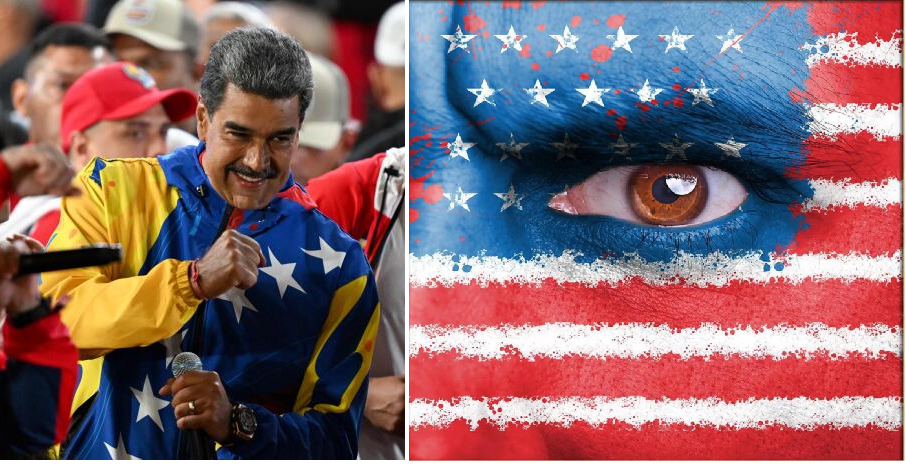
- The whole election process in Venezuela has been full of controversies and blame games, with both sides accusing each other of conspiracy with Western countries, particularly the United States of America.
- Nicolás Maduro has consistently accused the United States of meddling in Venezuelan affairs, while the U.S. has not supported Maduro’s administration, considering it a threat to American interests in the region.
- Despite the economic failures Venezuela faced under President Nicolás Maduro, it does not justify another country, including the US, intervening in Venezuela’s internal affairs.
The Presidential elections in Venezuela have concluded, with President Nicolás Maduro winning re-election. He secured 51% of the total vote, compared to his opponent from the Vente Venezuela party, Gonzalo González, who garnered 44%. Nicolás Maduro has been the President of Venezuela since 2013. The election results have drawn significant attention, as they differed from what exit polls had anticipated. Exit polls suggested that the opposition, Vente Venezuela, would achieve a substantial majority, but the official count confirmed Nicolás Maduro’s party as the largest in Venezuela.
The entire election process was intriguing, particularly due to the developments within the opposition party, Vente Venezuela. Initially, María Corina Machado, a prominent figure and the party’s first choice was considered a favourite to defeat Nicolás Maduro. However, the Supreme Court of Venezuela, the country’s highest judicial body, ruled that she was ineligible to run for the Presidential elections due to certain ties with external entities. As a result, Gonzalo González, the third choice from the party, ultimately ran against Nicolás Maduro. Despite these challenges, the election process concluded with Nicolás Maduro retaining the presidency.
The whole election process in Venezuela has been full of controversies and blame games, with both sides accusing each other of conspiracy with Western countries, particularly the United States of America. The Socialist Party, led by Nicolás Maduro, claimed that the United States has been trying to interfere in Venezuelan politics by supporting the opposition party, Vente Venezuela, financially and in other ways, to unseat Maduro.
María Corina Machado, the initial candidate from the Vente Venezuela party, had a central liberal ideology and policy approaches that differed significantly from Maduro’s. Her foreign policy manifesto included maintaining good relationships with the United States and its regional allies while rejecting the relationships with countries with which Maduro has maintained ties. This stance was a point of contention, as it included severing ties with countries that have been allies of Maduro.
Despite these controversies, the level of support for Vente Venezuela was surprising. For instance, at a public event in Caracas before the elections, nearly 200,000 people supported María Corina Machado. Witnessing this, the Maduro administration has accused the USA of helping Machado in the election.
Nicolás Maduro has consistently accused the United States of meddling in Venezuelan affairs. Historically, the U.S. has not supported Maduro’s administration, considering it a threat to American interests in the region. Venezuela holds the world’s largest reserves of oil, making it a crucial player in global oil supply chains. Under Maduro’s administration, Venezuela has resisted cooperating with the United States, which has sought alternative sources of oil to mitigate supply chain disruptions.
Additionally, Venezuela’s relationships with countries like China, Russia, and Iran have been problematic for the U.S. Maduro’s participation in groups like BRICS and Venezuela’s application for membership further strained relations. These factors underscore why the U.S. might want to see a change in Venezuela’s leadership.
One notable instance of U.S. interference occurred during Donald Trump’s presidency in 2016, when he announced support for a parallel government in Venezuela led by Juan Guaidó, rejecting Maduro’s administration. This move was seen as a violation of Venezuela’s sovereignty. Although the Biden administration later attempted to engage with Maduro’s government, talks did not progress well, as the U.S. demanded democratic elections in exchange for reducing sanctions, which did not materialize as hoped.
Given the historical examples of U.S. interventions in the region, it cannot be denied that the United States has intervened in Venezuelan politics. The idea that the U.S. is interested in controlling the region by influencing its political landscape is evident. The U.S. likely prefers a government in Venezuela that aligns with its interests.
This perspective is supported by the significant involvement of American allies in the region. For example, the current Argentine President, Javier Milei, was among those who openly supported María Corina Machado. This suggests a coordinated effort by the U.S. and its allies to promote a government in Venezuela that would be more favourable to their interests.
The parallels between the actions of the United States and its allies indicate a clear desire to change Venezuela’s leadership, aligning with its strategic objectives.
Despite the economic failures under President Nicolás Maduro, this does not justify another country intervening in Venezuela’s internal affairs. Every nation must respect the sovereignty of other countries. If there are problems or mistakes within a country, it is the responsibility of its citizens to address and resolve them.
Intervention by external forces, such as the United States, undermines the integrity and autonomy of the affected nation. The power to initiate change should remain with the people of the country, preserving their right to self-determination and maintaining national sovereignty.
References:
- https://www.investing.com/news/stock-market-news/us-accuses-venezuela-of-electoral-manipulation-repression-3542204
- https://www.sociostudies.org/almanac/articles/the_us_methods_and_goals_to_destabilize_venezuela/
Aayush Pal is a freelance writer on contemporary geopolitical developments. The views expressed in his work are entirely his own.
